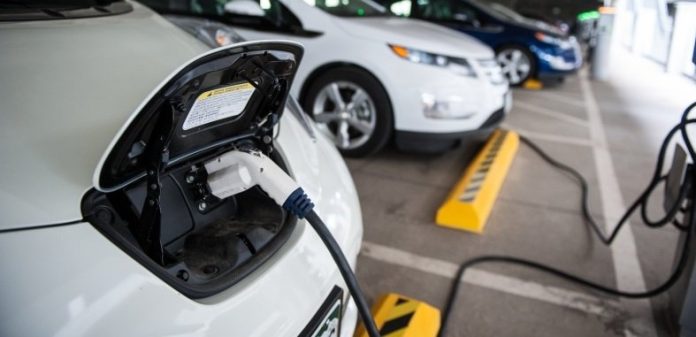On Monday, Flower Mound Town Council adopted an amendment proposed by the Fire Department that restricts where electric vehicle chargers can go in parking structures, like parking garages, to prevent fires.
The amendment limits high-voltage EV charging stations to the ground floor in parking garages and controls where charging stations should be placed outside. This would allow first responders easy access to vehicles that have caught on fire while charging.
Fire Chief Paul Henley said 30% of EV fires occur because of lithium-ion battery failure while the vehicle is charging. The other 70% often come from collision, but can also come from overheating and manufacturing defects.
It also requires sprinklers for indoor commercial use, emergency stops, requires bollards around the station and prohibits chargers in underground garages and storage of damaged EV batteries indoors unless approved.
Henley led the lengthy discussion with Council, presenting the challenges and dangers that the Town and the fire department face with EV chargers.
“Once the lithium-ion battery gets involved, it’s a hazmat incident,” he said. “And when it happens in an enclosed space, there is nowhere for the heat to go because it is trapped in these concrete structures.”
Chargers that are located in homes and personal garages are the lowest-level of charger, which have risks, but Henley is targeting higher-level chargers that are often seen in parking lots and parking garages.
Henley said fires involving electric vehicles are unique because the heat comes from internal chemical energy instead of flames, they don’t need much oxygen to start and continue, and the intense heat, which can reach up to 4,000 degrees Fahrenheit, can ignite surrounding materials and injure responders at further distances.
The fires also present new problems because they present electric hazards, release toxic gases that can run off and destroy structures or the environment and can reignite hours or days later.
For firefighters, Henley said the best option is to cool the vehicle enough to put a special blanket on so it can be moved into a safer location and burn itself out.
“Nothing is going to put it out,” he said. “Any water isn’t going to put it out. The goal is to protect exposure by cooling it enough to move it.”
The most effective option, Henley said, is full submersion of the vehicle by itself, in case it reignites again.
High-volume sprinklers could be an option in a parking garage, but it would mostly act to protect the structure, the surrounding concrete and other vehicles.
Mayor Pro Tem Ann Martin asked if there would be a situation when Henley would call his firefighters back from an EV fire because it is too risky.
He said yes, especially if it is on the second, third, fourth or higher level of a parking garage.
EV charging safety and development questions
Henley said EVs are generally safe if the car is new and the battery is new and well-maintained, but the Town is preparing for circumstances when they aren’t in perfect condition.
“EVs are proliferating,” said Henley. “I think they’ll evolve into something new and safer, but we’ll have this legacy problem for quite a while because of all the cars on the market.”
He also said EV fires only occur in 25 cars out of 100,000.
“These are inherently safe, I will say that,” said Henley. “It only happens 25 out of 100,000 times, but you’ll see that number going up because there are more EVs on the road now.”
Kyle Cooper, a representative from Realty Capital, the company with the Lakeside development, asked Council to grandfather in their parking garages near Lake Grapevine, which were approved before the amendment went into effect.
“It could limit the sense of security for residents,” he said. “A tenant could choose a Frisco development instead, or somewhere with EV stations on a more secure, upper level.”
One of the Lakeside apartment buildings, 3111 Sunset, has a security gate on the second floor and open parking on the ground floor. They are asking for Council to allow them to use EV chargers on the second floor so residents can park behind that security gate.
Henley said the department and Lakeside have been working together to come up with a plan that works for both.
“I don’t want to hurt any development,” he said. “I just want to make it as safe as possible moving forward.”
Henley said he realizes it could pose an inconvenience for some residents in tall buildings, but said safety should be favored over convenience.
“I look through the lens of safety,” he said. “I have to look at the lowest common denominator and the worst possible outcome and try to mitigate that.”
The amendment passed unanimously, but the Town is still working with Realty Capital and Lakeside, which could lead to another amendment in the near future.



















